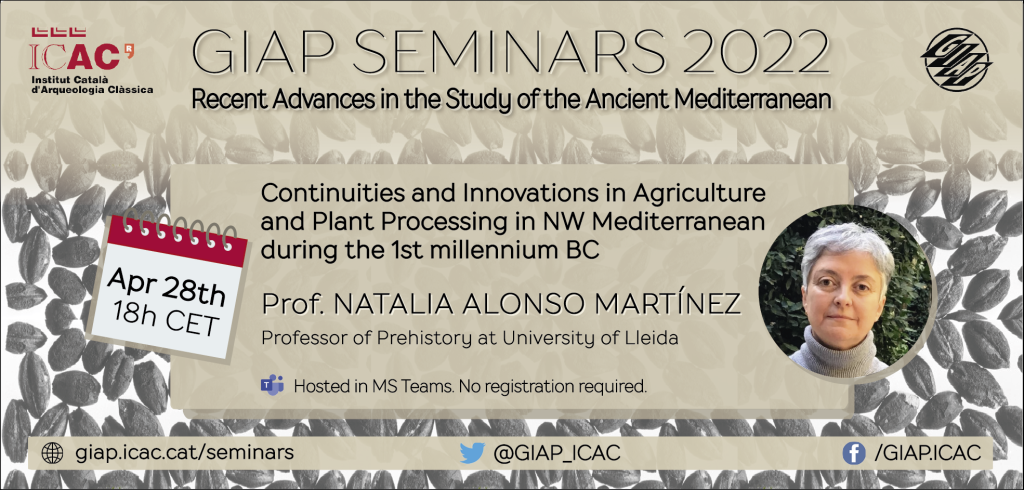After a very successful first series in 2021, the GIAP Seminars come back for a 2nd year!
Organised by GIAP predoctoral and postdoctorals researchers, #GIAPseminars are a reflection of their current research interests. The series aims to provide glimpses of original and current research across the world, opening up new horizons in Landscape, Computational and Palaeoenvironmental Archaeology, and Bioarchaeology.
Regardless of career stage or academic position, GIAP invites prominent researchers that reflect the interdisciplinarity and diversity of the field. Overall, the GIAP Seminars are an excellent opportunity to foster talent, broaden interests, and network.
There will be 1-hour monthly seminars, with 45′ of talk & 15′ of discussion, from February to June 2022. Addressed to researchers and students with interest in the listed topics. More info.
GIAP webinars are online, open events. No registration is required. We’ll share access links through our websites and social media.
Session 3 will be next April 28, at 18 h CET, with Prof. Natalia Alonso Martínez (professor of Prehistory at the University of Lleida).
‘Continuities and Innovations in Agriculture and Plant Processing in NW Mediterranean during the 1st millennium BC’
Access the webinar here: https://bit.ly/JoinGIAPseminar
No registration is required. Hosted in Microsoft Teams (no Microsoft/Teams account needed)

Abstract:
The western Mediterranean’s first millennium BC witnessed a transformation of small-scale communities into stratified complex societies, a trend particularly noteworthy among the Iberian Culture. Cities and oppida became territorial centres that structured social and economic relations. They were ruled by emerging or consolidated elites who appropriated the processing and distribution of agricultural products. The expansion and consolidation of these new socioeconomic structures are linked to multiple factors including technological changes in agriculture and how its products are made. The basis of agriculture remains basically the cultivation of rain-fed wheat and barley, as in the second millennium BC. Nevertheless, a distinctive feature is the convergence of several technological innovations that will change the scale of agricultural production: the adoption of new crops and new products (mainly arboriculture and wine); the introduction of iron tools (including iron ploughshare); and the invention of the rotary mill. Two different agricultural traditions emerged as a result of this process: in the East of the Iberian Peninsula, more diversified; in the Northeast, predominantly focused on grain production.
About Prof. Alonso:
Natàlia Alonso is professor of Prehistory at the University of Lleida. Her scientific interests revolve around agriculture and the processes of transforming crops to products (tools, storage practices, milling technology), always focusing on Protohistoric agriculture in the Western Mediterranean. These have led her to explore aspects of palaeoecology, isotopic analysis, wild fruit exploitation, food and especially cereal crops and their processing (agricultural and domestic), and gender. She has in the last decade also incorporated new lines of research such as ethnoarchaeology, experimental archaeology and didactic studies. She is coordinator of the Grup d’Investigació Prehistòrica (GIP-UdL) and their excavations, and has been the leader of the R+D projects ‘Agrifood practices, settlements and domestic spaces. Evolution the Plains of the southern Pyrenees (3rd-1st millennium BCE)’ (2017-2019, HAR2016-78277-R) and ‘Mobility, circulation and exchange in the Catalan Western Plain between the third and first millennium BCE’ (2020-2023, PID2019-110022GB-I00P). She has been also PI of the project ‘Archaeological approach to agri-food practices: links between the past and present (ArqueoAgro)’, (INDEST-UdL, 2019-2021), and coordinator of the Research Network ‘ArqueoCULT. Archaeology of Past Crops’ (RED2018-102440-T, 2020-2021).





